The Jackery Solar Generator 2000 Plus portable power station was designed with expansion capabilities in mind, all while remaining impressively quiet during operation.
Portable power stations are extra-large, portable batteries that can power everything from an iPhone to an RV. The market is full of such products, so finding something that fits your needs is easy.
This review covers the Jackery Explorer Kit 4000 with two SolarSaga 200W panels. That's a Jackery Explorer 2000 Plus Portable Power Station, a Jackery Battery Pack 2000 Plus, and two solar panels.
Like many power station brands, each combination and set comes with its own branding. As the title suggests, this set is referred to as the Jackery Solar Generator 2000 Plus.
The review will focus on the central unit, the Explorer 2000 Plus, but will mention the uses of the other items included in this $5,000 combo set. This system is a newer version with an LFP battery versus the lithium-ion Jackery Solar Generator 3000 Pro previously reviewed on AppleInsider.
Not all portable power stations are alike, as we've outlined in our roundup. Each fits within a specific use case, and it seems the Explorer 2000 Plus is a great option for those seeking power and mobility in a product about the size of a drink cooler.
Jackery Solar Generator 2000 Plus review — features
The Jackery Explorer Kit 4000 with two solar panels is an extensive setup that should handle all but the most extreme needs. While it won't power your whole home for long without expansion, it can keep necessary appliances running during a blackout or keep devices charged during an extended camping trip.
The Jackery Explorer 2000 Plus, on its own, offers 2kWh of capacity, which can be expanded to 24kWh if you're willing to spend $22,500. However, the one unit and expansion pack is more than enough at 4kWh.
The hefty drink cooler-sized battery weighs 61.5 pounds, measuring 14.7 inches tall, 18.6 inches wide, and 14.1 inches deep. Its saving grace is the built-in luggage-like handle and wheels for easy transportation.
It uses LiFePO4 (LFP) battery chemistry instead of lithium-ion, a trend in these larger batteries. LFP is more efficient and safer and doubles the life of the product at 4,000 charge cycles versus 2,000 in the Jackery 3000 Pro mentioned earlier.
There are nine outputs: four 120V 20A grounded AC plugs, one 120V 25A plug, one Car Port, two USB-A 3.0 ports at 18W max each, and two USB-C ports at 100W max each.
There are multiple inputs in the rear of the battery: AC expansion for connecting another Explorer 2000 Plus, AC input for charging via the wall, DC input for charging via solar panels, and DC expansion for connecting the Battery Pack 2000 Plus.
A display on the front of the battery shows all necessary info and buttons control power to each output. The Jackery app also allows controlling the battery's various functions.
The Jackery Explorer 2000 Plus is available for $2,199 from Jackery on its own.
Jackery Battery Pack 2000 Plus review — weight and design
The Jackery Battery Pack 2000 Plus is essentially the Jackery Explorer 2000 Plus without all the ports and display. This is why it still weighs 41.9 pounds at 2/3 the height.
It has a 2kWh capacity using LFP battery chemistry. It doesn't work independently and must be paired with the Jackery Explorer 2000 Plus.
What makes this battery expansion unique is its two DC inputs for solar panels. That gives users another option for connecting solar panels and improves the overall expandability of the system.
For example, with two expansion batteries, the user could have one battery out where the solar panels are, recharging in 2 to 7 hours, while the other is attached to the Jackery Explorer 2000 Plus. Switch out these expansions to keep the main battery topped off while not having to keep the larger main battery near the solar panels.
Get the Jackery Battery Pack 2000 Plus for $1,599 from Jackery. Again, this device doesn't function without the main Explorer 2000 Plus.
SolarSaga 200W solar panels
The kit we're testing from Jackery came with two SolarSaga 200W solar panels. They operate at the industry standard 24.3% conversion efficiency and have an IP67 rating.
Like other panels of its type, the SolarSaga 200W panels fold up into a briefcase-like carrying mode. They weigh 17.5 pounds and are made from monocrystalline silicon solar cells.
The 200W rating is a max rating, and users likely won't encounter this input without perfect conditions. We saw over 100W from each panel from clear skies and a general angle facing the sun.
Get the SolarSaga 200W solar panel for $699 from Jackery.
Using the Jackery Solar Generator 2000 Plus portable power station
We've tested many of these portable power stations, big and small, and they tend to operate similarly. Move them to where they are needed, power them on, plug things in, and add power with expansion and solar.
That means evaluating these packs based on quality-of-life additions, app usefulness, and total efficiency is more important than simple specs. These batteries can charge and discharge, but portability solutions, storage options, noise levels, and actual usage are more important metrics for a comprehensive review.
Jackery Solar Generator 2000 Plus review — Off-roading not recommended
Portable power stations are not easy to move about, despite their name. The dense nature of the batteries makes these large and awkward objects that need some muscle to lug about.
Thankfully, Jackery tries to solve this with some wheels and an extendable handle. However, these solutions are not foolproof.
When we took the Jackery system out for testing and photos, it seemed like an obvious solution to stack the battery and extension and move this 100-pound load with the wheels. That was a mistake, as evidenced by the damage to the top right of the extension battery after taking a tumble onto asphalt.
Asphalt, concrete, and other seemingly flat surfaces still have enough imperfections to cause the heavy unit to vibrate while rolling, eventually pushing the extension off the top. This was our mistake, but it still seemed like a solution that should have worked.
Then, we tried moving the battery on its own. It rolled fine across most paved surfaces, but gravel would cause it to come to a halt, wrenching the handle from our hands and having the whole pack smack into the ground.
Also, when moving off paved surfaces, the wheels stop being of any use. Sure, they aren't meant to solve all transport needs, but we'd have liked more rugged wheels if the Jackery portable power station is to be used in outdoor environments.
So, we're back to lifting the battery pack and carrying it to our destination if the trip isn't entirely on paved surfaces. Plus, another trip to return and get the expansion pack.
Jackery Solar Generator 2000 Plus review — Charge, discharge, and efficiency
Other power stations of this size easily break ten outputs, but this unit only offers nine. That hasn't been an issue in our testing since they are the perfect variety of ports for our use.
The two USB-C ports offering 100W output is perfect for keeping our 14-inch MacBook Pro and 12.9-inch iPad Pro charged without needing bulky power adapters. The USB-A ports are more than enough for charging our iPhone, Apple Watch, or AirPods.
The four AC outlets can power any necessary electronics, including portable lights and electronic coolers.
At home, the outlet variety also means we can keep our refrigerator powered during a blackout, charge our devices, and still have space for a fan to keep air circulating in the intense summer heat. The 25A AC outlet could also power appliances in an RV.
We've found that the two solar panels work great in tandem. They are both rated at 200W, but it's rare to see any solar panel output their rated voltage — so having two attached at once can easily see 200W to 300W of charging input during use.
Charging from an AC port can top off the Jackery Explorer 2000 Plus in just 2 hours. Optimal solar charging with two solar panels can top off the battery in about 7 hours.
Depending on what you're trying to do, that input could mean having a topped-off battery even when used heavily on a campsite. Or, if power is out at home, it means keeping the fridge running for hours longer than the portable power station could on its own, thanks to solar.
At 3,000W max output and 6,000W surge peak, Jackery Explorer 2000 Plus can handle most appliances and off-grid use cases. Of course, the larger the connected loads, the faster the power station drains.
The Jackery Explorer 2000 Plus and the expansion battery operate fairly quietly. When charging or discharging at a high rate, the fans kick on higher to improve cooling as needed — which didn't exceed 60 dB with our noise meter right next to the exhaust.
The quiet charging mode found in the Jackery app reduces charging speed to keep exhaust levels below 30 dB. We found that the battery has a low hum in most conditions and is easily drowned out by music or other ambient noise, so quiet mode isn't always needed.
Jackery Solar Generator 2000 Plus review — The Jackery app
Like other portable power stations, the Jackery app allows users to control certain features. The app is the only way to control battery-saving or quiet charging modes.
Adding the battery to the Jackery app lets it sync up with your device's Wi-Fi network. This allows checking the battery's status and control features even when remote.
Jackery Solar Generator 2000 Plus review — Portable enough power
The Jackery Solar Generator 2000 Plus kit provides plenty of power in a mostly portable package. Wheels make the weight easier to move — as long as you're on a semi-flat surface.
Home backup solutions are becoming more important with each passing year. The electric grid isn't as reliable as it used to be, and extreme weather is on the rise.
So, whether you're looking for a portable power station and expansion for keeping the lights on during the next power outage or want to camp away from power sources, Jackery's Solar Generator 2000 Plus is an excellent solution.
Our thoughts about this product echo Mike Wuerthele's about the previous generation model, the 3000 Pro. It's an excellent power source on wheels, and LFP gives it a longer service life even though it trades off capacity.
Jackery Solar Generator 2000 Plus - Pros
- 4kWh in this 100-pound bundle
- Perfect balance of USB and outlets
- 3,000W max output, 6,000W surge
- Wheels!
Jackery Solar Generator 2000 Plus - Cons
- Wheels can't go off-roading
- Heavy for a portable object, made worse by expansion battery.
- High-priced package at $5K
Rating: 4 out of 5
The standalone portable power supply is the deciding factor of our score. The 2kWh capacity, combined with its extensive expandability, makes it an excellent solution for portable power.
We wish the wheels were built for more rugged use. Plus, the expansion battery should have a way to attach when stacked for easier transport.
Where to buy the Jackery Solar Generator 2000 Plus
The Jackery Explorer 2000 Plus portable power station with Battery Pack 2000 Plus and two SolarSaga 200W panels is $4,999 from Jackery. The company offers a $750 coupon at checkout with code PLUS750 until September 14.
The kit is also on sale on Amazon at 15% off for $4,249 at the time of publication.
 Wesley Hilliard
Wesley Hilliard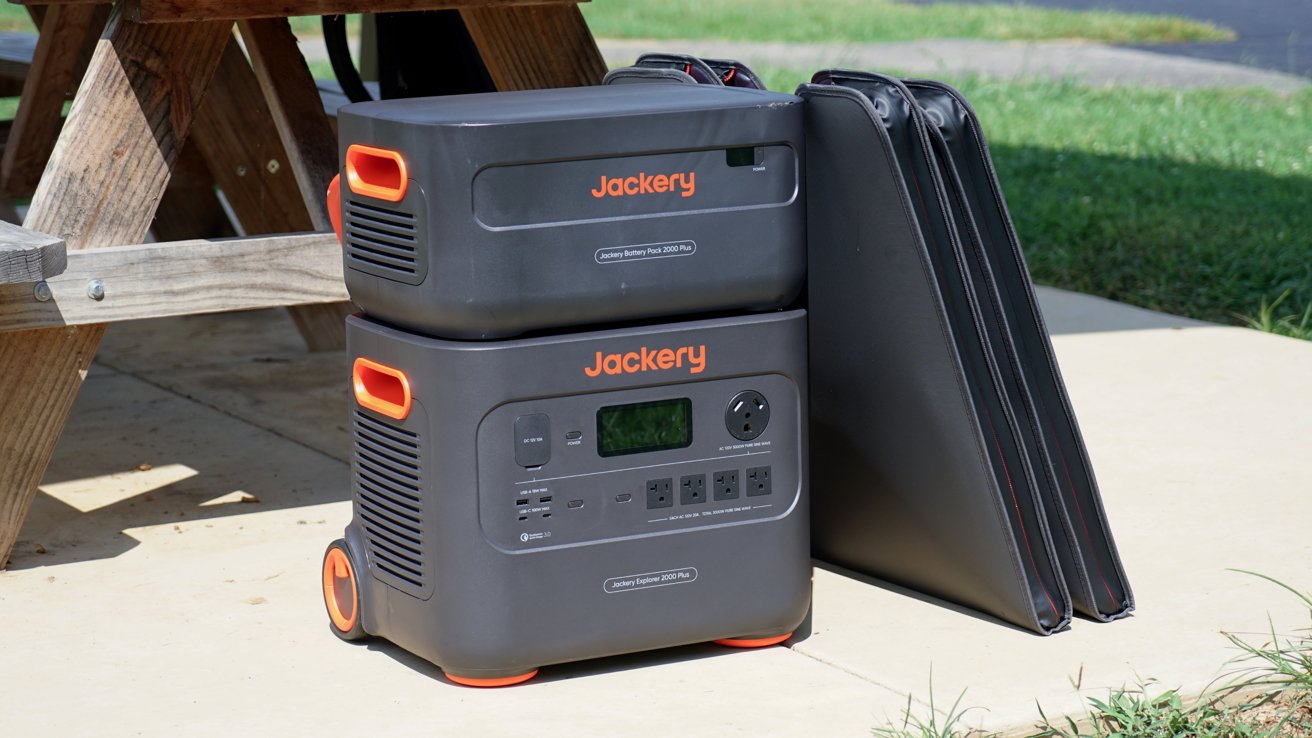
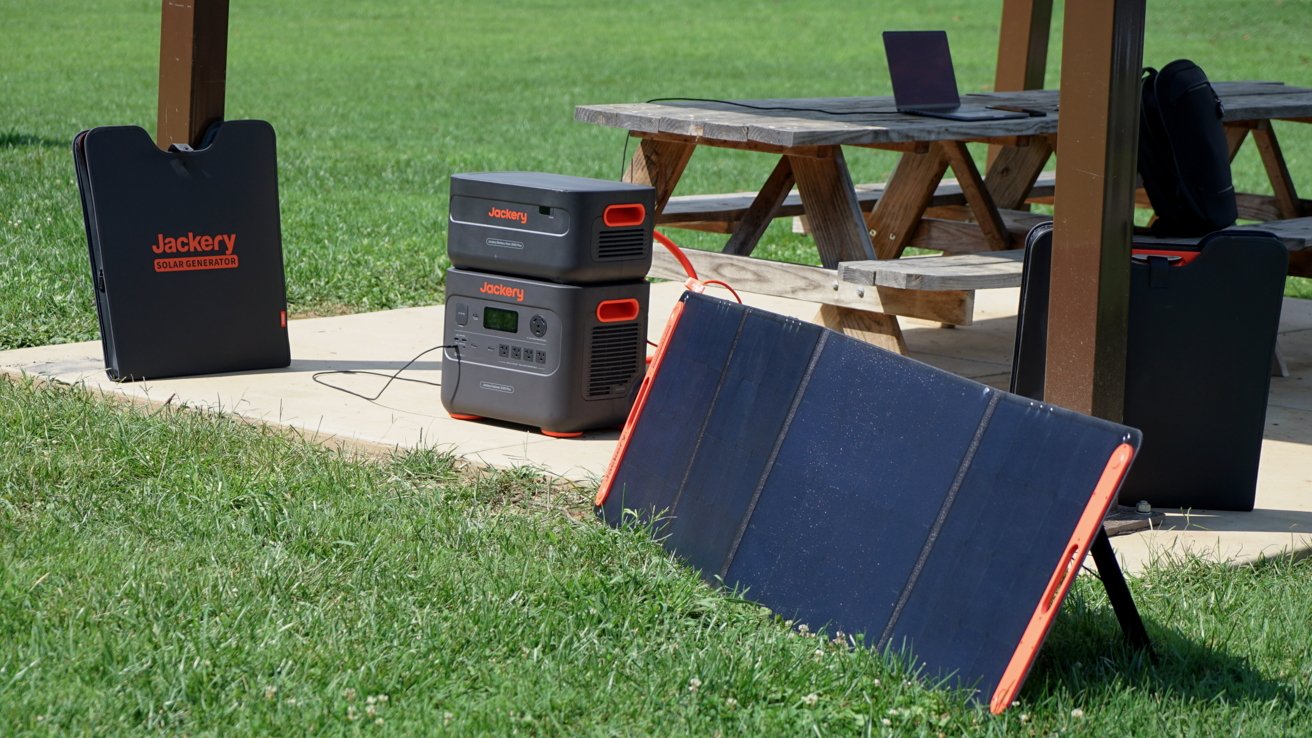
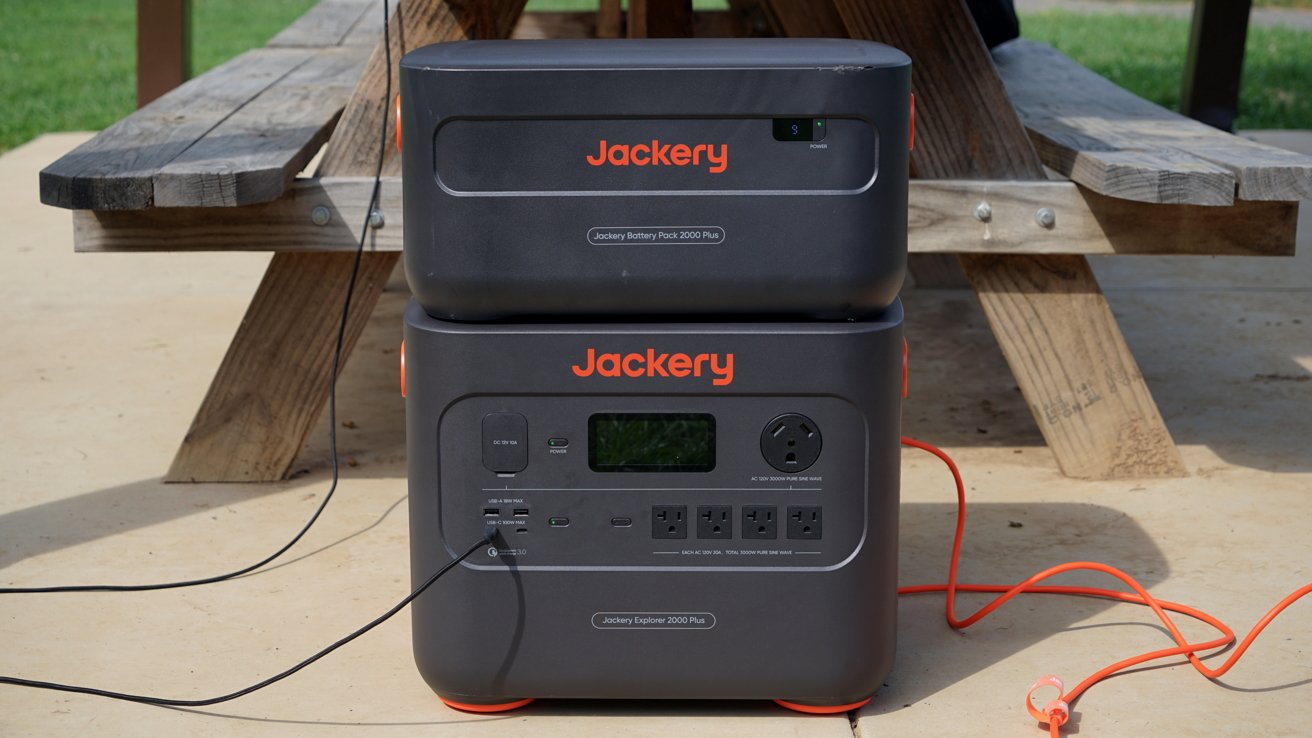
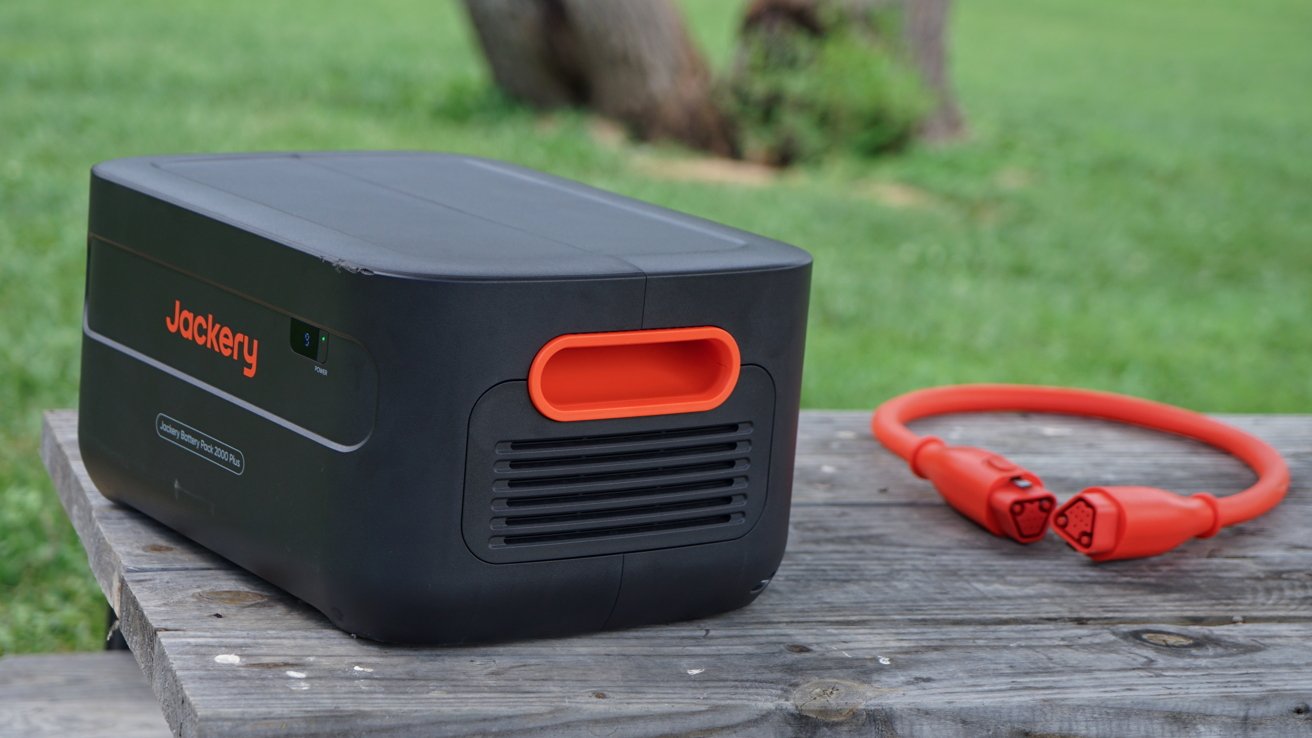
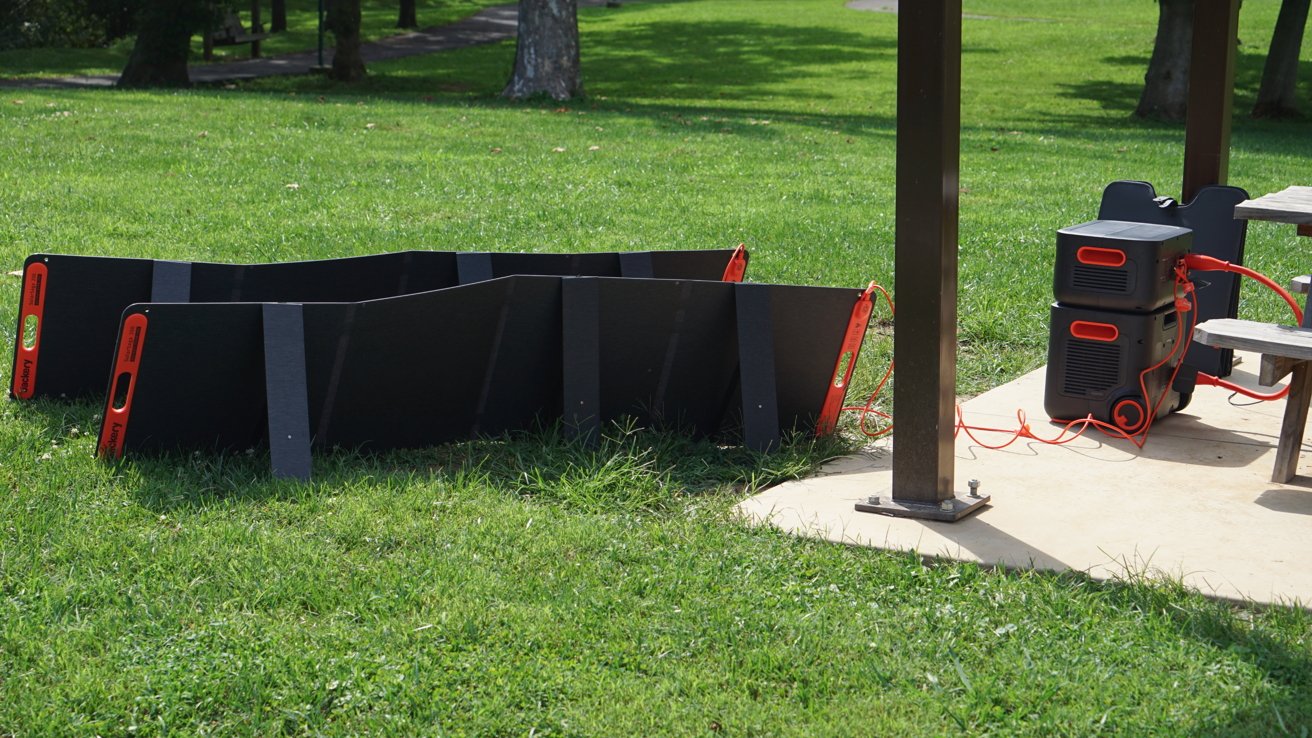
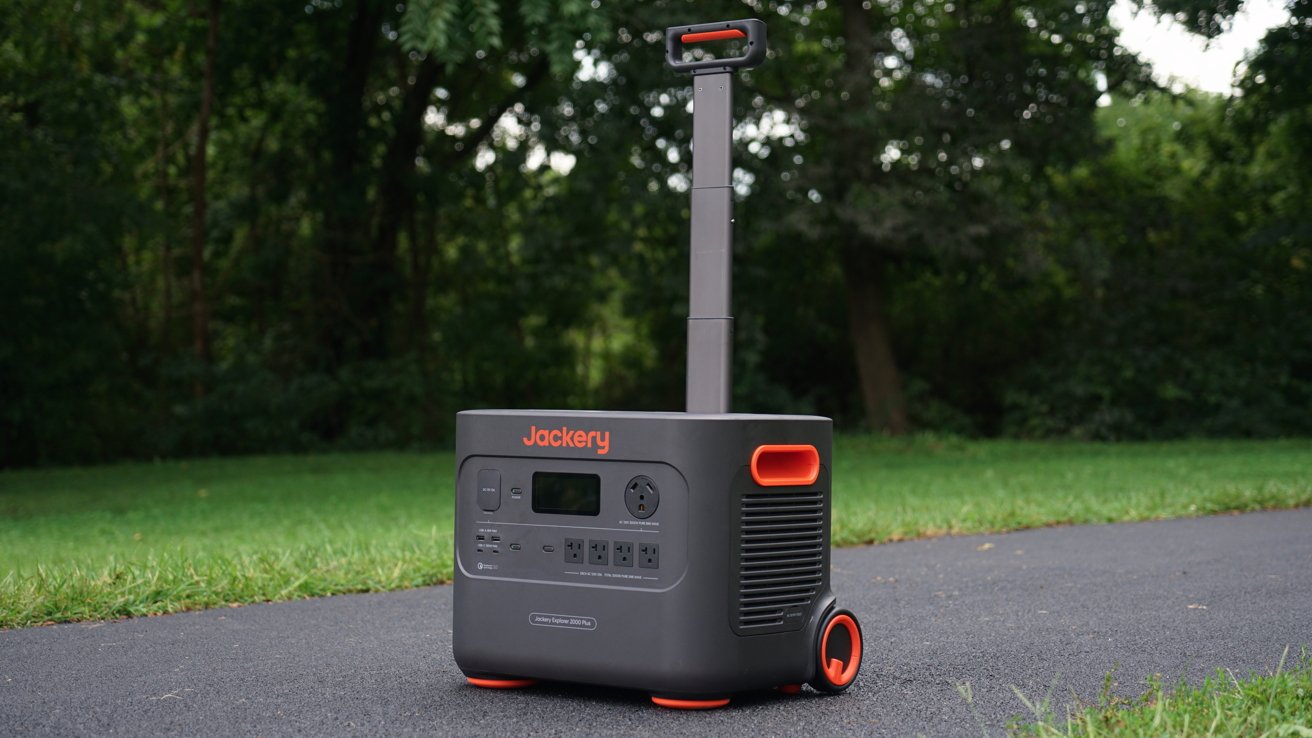
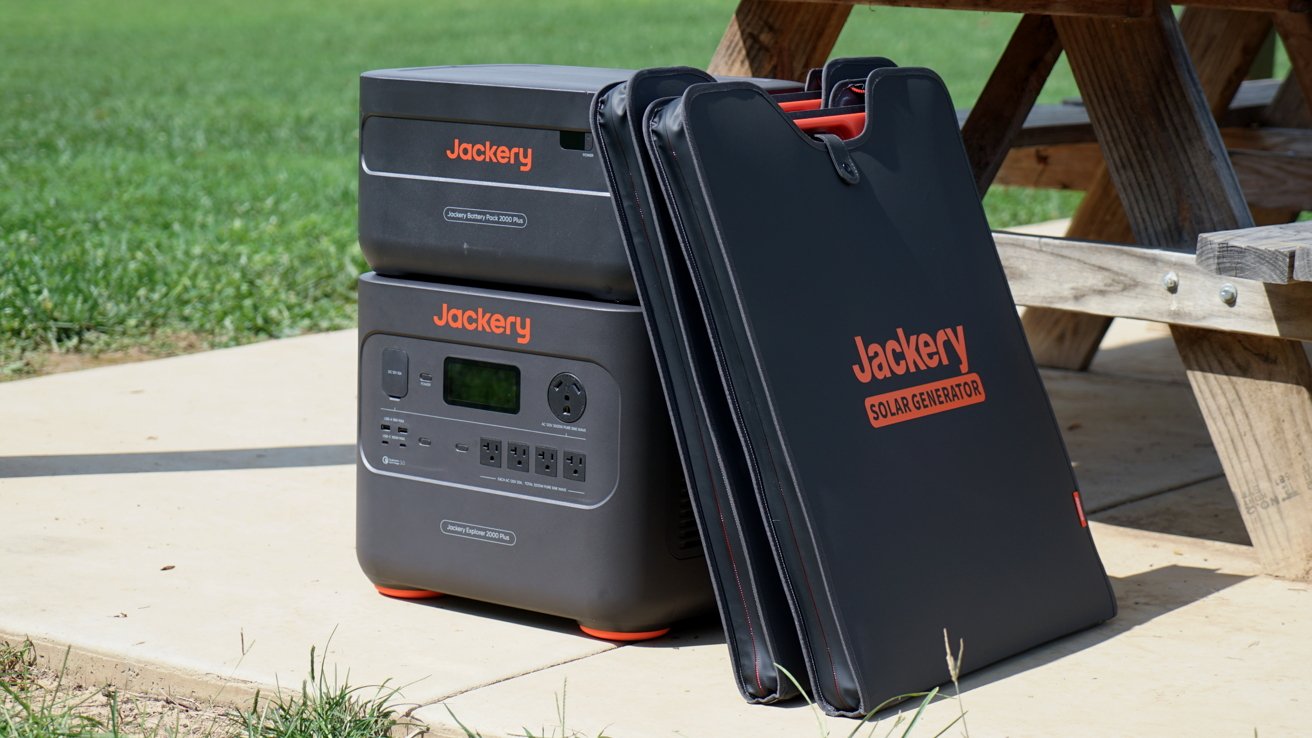
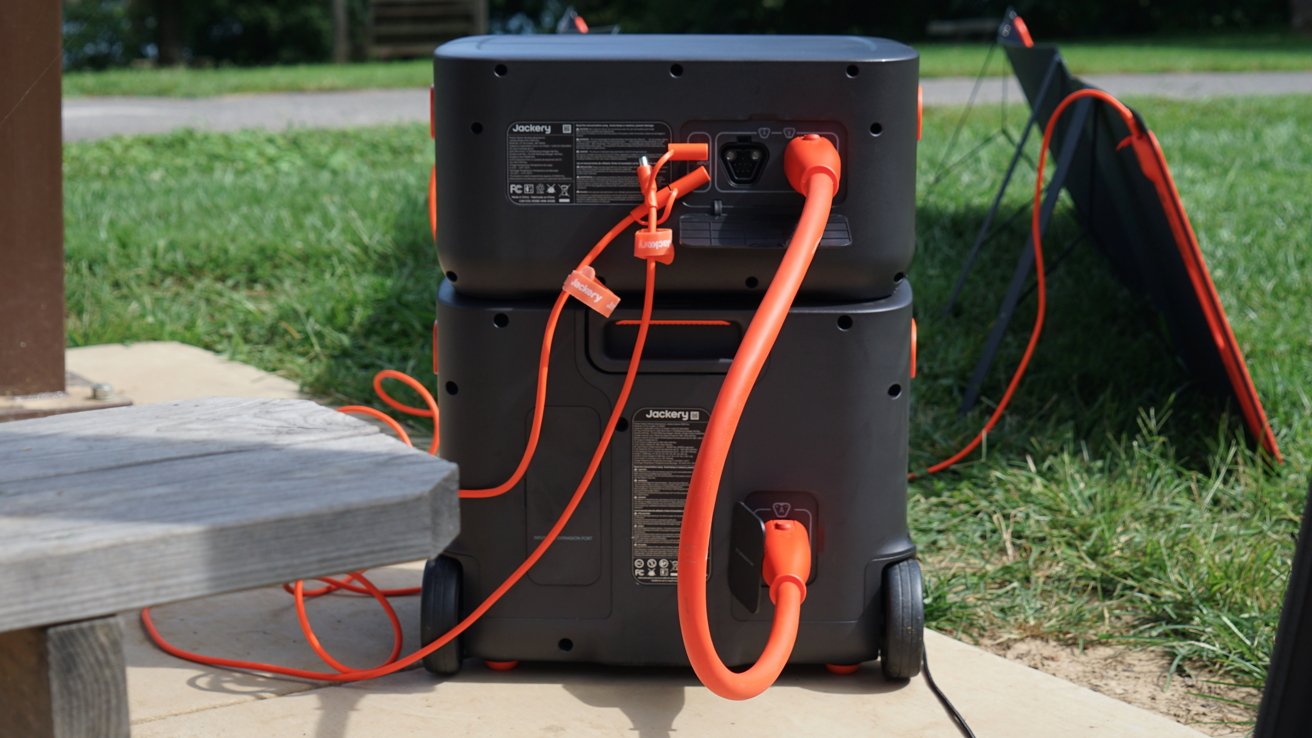
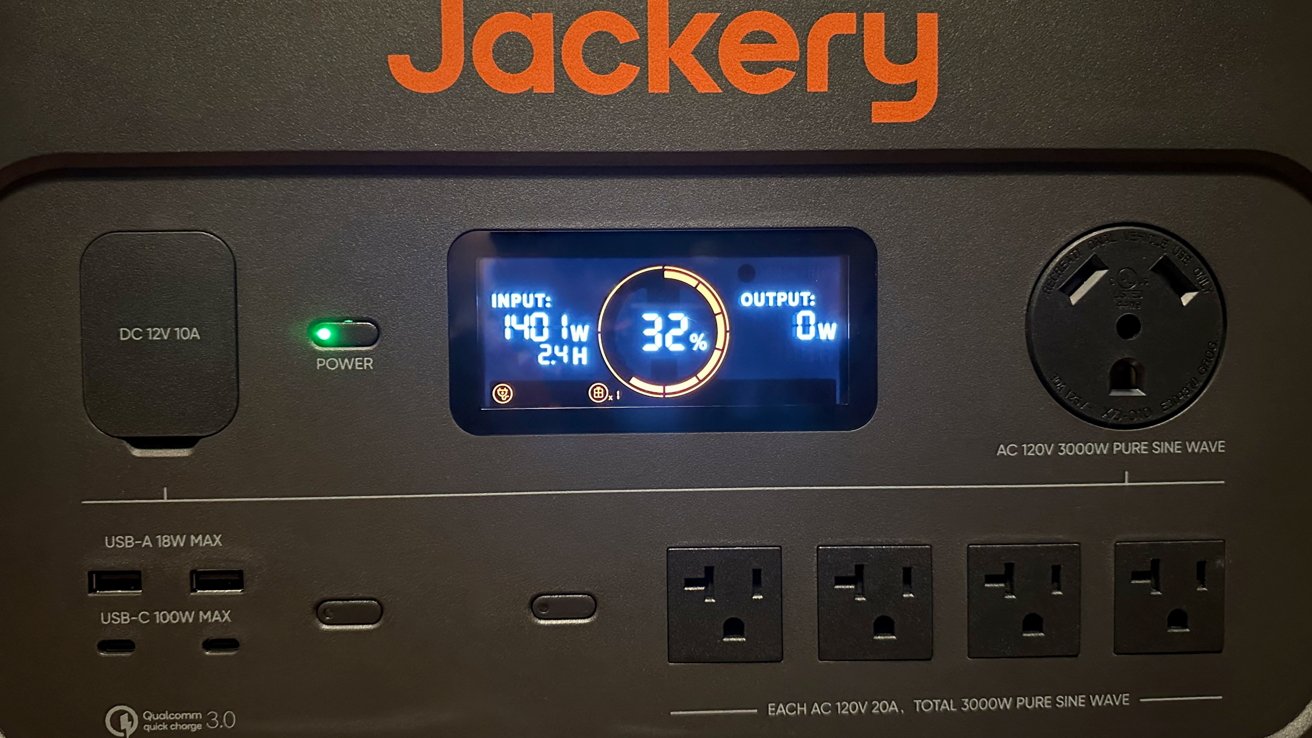
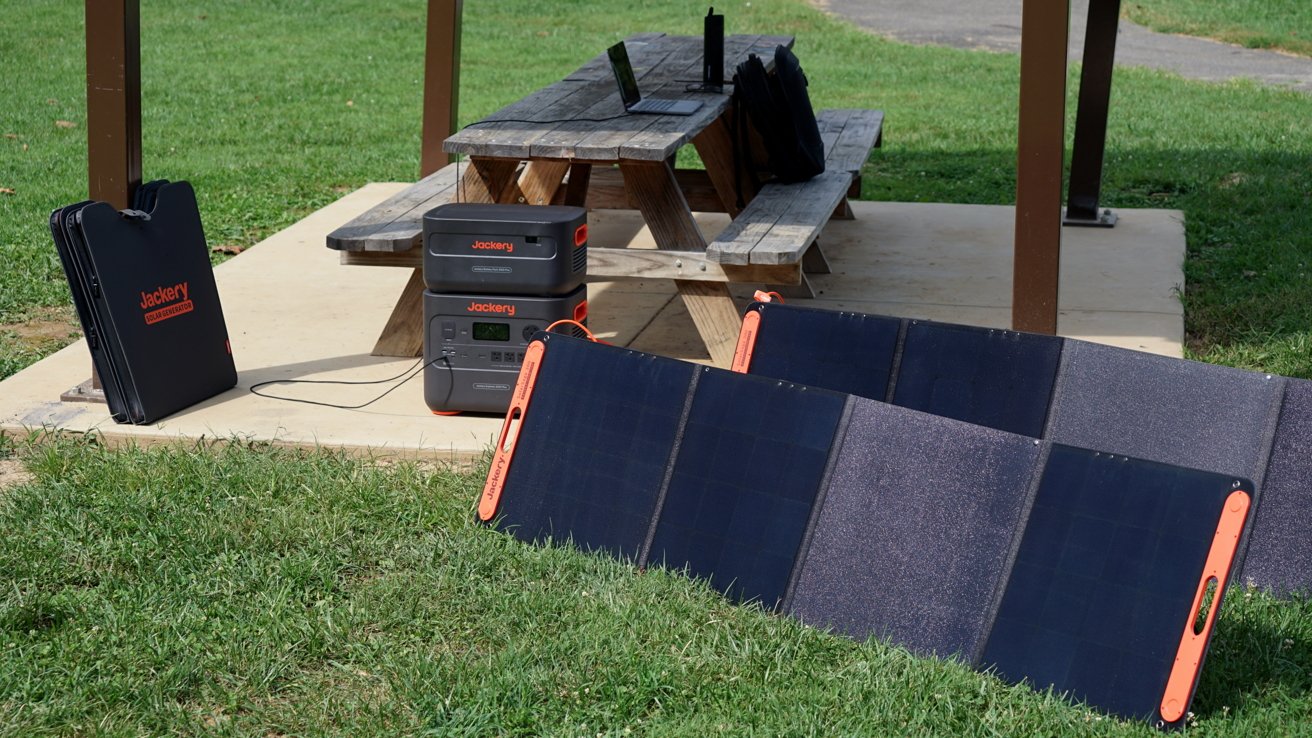







-m.jpg)






 Thomas Sibilly
Thomas Sibilly

 Marko Zivkovic
Marko Zivkovic

 Malcolm Owen
Malcolm Owen

 Amber Neely
Amber Neely










4 Comments
If you want to stack the units put a pice of high density foam between them to reduce the vibration effects to a negligible level.
1 x 12V/10A (Car Outlet)
2 x 12V/3A (5.5mm Outlet)
*All Regulated.
For ham radio and RV applications, having 12V DC ports that support greater than 10 amps is essential. The Jackery Plus products defeat one of the key advantages of LiFePO4 battery cell technology.
I have the Jackery 2000. I had it charged up to 100%, now down to 85%. I'm doing some testing to see how long it will charge my small garage refridgerator.
I have one 200w panel connected, and it is producing 143 watts. The refridgerator is drawing 50w. Yet the charge seems to stay at 85%. I've had it hooked up like this for 2 hours. Shouldn't the battery be gaining since the panel is producing 100W more than being drawn? Or is that so small that it would take forever to gain capacity? I may try again with adding the 2nd solar panel.